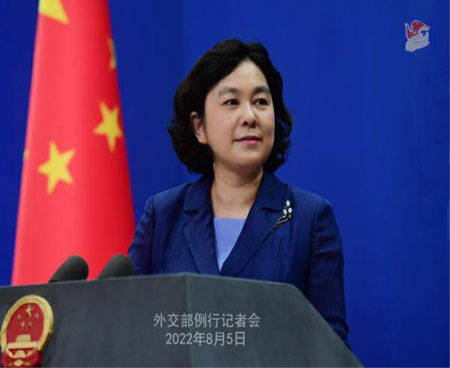Chinese FM Wang Yi to visit Bangladesh, Mongolia
A Chinese Foreign Ministry Spokesperson said on Friday that China’s position on the Kashmir issue was clear and consistent and called for resolution of the longstanding dispute peacefully through dialogue and consultations for the regional peace and stability.
On the issue of Kashmir, China’s position is clear and consistent. This is an issue leftover from history between India and Pakistan and this is also shared view of the international community, Hua Chunying said during his regular briefing in response to a question asked by APP.
Today is the third anniversary of India’s unilateral actions in Occupied Kashmir, violating the United Nations (UN) resolutions on the disputed territory.
The spokesperson said that three years ago, ac-tually the Chinese side already stated that there should be restraint and prudence for relevant parties.
Especially, the parties should avoid taking uni-lateral actions to change the status quo or to escalate tensions, she added.
We call on both parties to resolve the dispute through dialogue and consultation peacefully for the region to remain peaceful and stable, she said.
On August 5, 2019, the Modi-led Bharatiya Janata Party government had struck down Articles 370 and 35-A of the Indian constitution, thereby scrapping the law that granted Kashmir its special status.
Meanwhile, in a recent statement, Cheng Xizhong, Visiting Professor of Southwest University of Political Science and Law said that the Kashmir issue was the core obstacle to the normalization of relations between India and Pakistan and to peace and stability in the South Asian Sub continent.
He said, India changed the status of Kashmir on August 5, 2019, which further complicated the Kashmir issue. Therefore, the key to normalizing India-Pakistan relations was for India to take the initiative to immediately restore the original status of Kashmir.
Prof Cheng, who is also a senior fellow of the Charhar Institute, opined that the international community should take strong and concerted actions, forcing India to immediately halt and reverse unilateral and all illegal actions it has taken in IIOJK and fulfill its obligations under the relevant UNSC resolutions.
He suggested that first, the UNSC should pay more close attention to India’s unilateral and illegal actions in IIOJK, which were seriously endangering regional peace; second, because India has seriously violated the fundamental human rights of the Kash-miri people, all international human rights organiza-tions should continue to put pressure on India; third, all countries responsible for world peace, especially big powers, should impose the most severe sanctions on India, forcing the Narendra Modi regime to rectify its evil ways with strong measures.
The Kashmiris have the full right to decide their own destiny. The Kashmiris should have the final say on the Kashmir issue.
I firmly believe that the Kashmiri people who have been fighting for national self-determination for decades will win the final victory, he added.
China’s State Councilor and Foreign Minister Wang Yi will visit Bangladesh and Mongolia from August 6-8, at the invitation of his Bangladeshi and Mongolian counterparts respectively, Chinese For-eign Minister Spokesperson, Hua Chunying an-nounced on Friday.
During his visit to Bangladesh, Wang Yi will meet with Bangladeshi leaders, hold talks with For-eign Minister Abdul Momen, and exchange views on bilateral relations and international and regional issues of common concern.
“China always attaches great importance to de-veloping relations with Bangladesh, and looks for-ward to promoting the implementation of the impor-tant consensus reached by the leaders of the two countries, deepening mutually beneficial cooperation and elevating the development level of bilateral relations through this visit, Hua Chunying said dur-ing her regular briefing.
During his visit to Mongolia, Wang Yi will meet with Mongolian leaders and hold talks with his counterpart Batmunkh Battsetseg.
She said that the two sides would conduct stra-tegic communication on bilateral relations, practical cooperation and international and regional issues of common concern.
In recent years, China-Mongolia relations have maintained a high level of development. China looks forward to further strengthening communication and coordination with Mongolia, enhancing political mutual trust and comprehensively promoting practical cooperation in various fields through this visit, she added.
According to the spokesperson, Wang Yi will also receive foreign ministers from South Korea and Nepal respectively in Qingdao.
This year marks the 30th anniversary of the es-tablishment of diplomatic relations between China and the ROK, and bilateral relations face important opportunities for deepening development.
This visit is Foreign Minister Park Jin’s first visit to China, and it is also the first high-level delegation to visit China after the new Korean government took office.
Hua Chunying informed that China and Nepal are good neighbors, good friends and good partners. Nepalese Foreign Minister Dr. Narayan Khadka’s visit to China is a return visit to Wang Yi’s visit to Nepal in March.
The spokesperson said that the foreign ministers of the two countries exchanged visits in less than half a year, which reflects the mutual trust and friendship between China and Nepal.
“The Chinese side looks forward to further strengthening strategic communication with the Nepali side through this visit, firmly supporting each other, and pushing forward the China-Nepalese strategic partnership of friendship for development and prosperity for generations,” she added.










